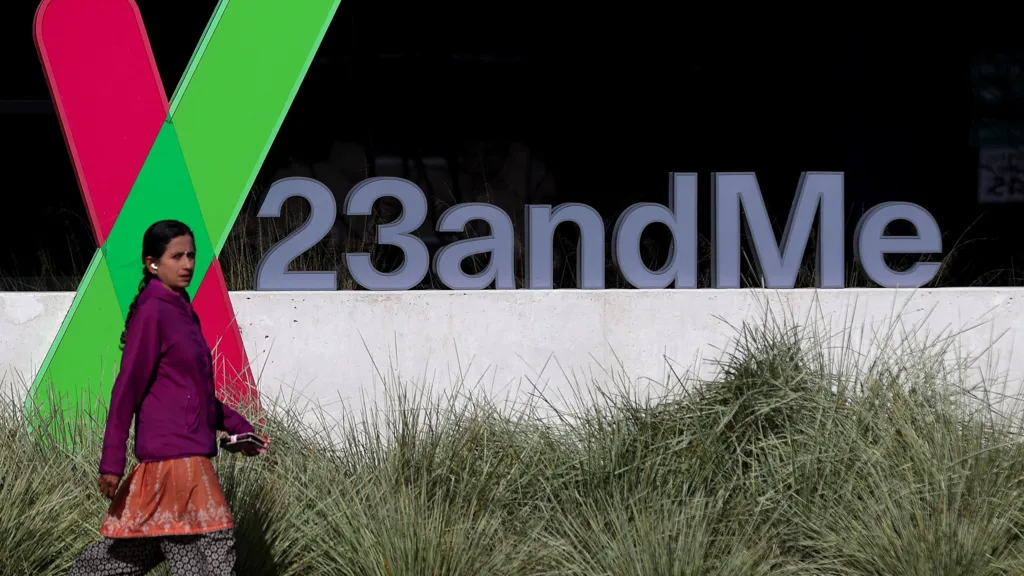DNA-testing site 23andMe to lay off 40% of its workers
3 min read
Genetic testing company 23andMe has announced it will lay off 40% of its workforce, amounting to approximately 200 employees, as part of a major restructuring effort aimed at stabilizing the business. In addition to the job cuts, the company also revealed that it will halt work on several therapies it had been developing.
Once a leader in the genetic testing industry, 23andMe has faced significant challenges in recent years. The company’s share price has plummeted by more than 70% in 2024, further complicating its efforts to regain profitability. Co-founder and CEO Anne Wojcicki, who has spearheaded the company’s growth, is now focused on turning the business around by refocusing on its core consumer offerings, including ancestry services and health insights, as well as its research partnerships.
Wojcicki addressed the company’s difficulties in a statement, acknowledging the tough decisions being made to ensure long-term success. “We are taking these difficult but necessary actions as we restructure 23andMe and focus on the long-term success of our core consumer business and research partnerships,” she said. The company expects the restructuring plan to cost $12 million, which includes severance pay and other one-time expenses, but it will save $35 million annually.
In a further shift, 23andMe is re-evaluating its portfolio of therapies in development. The company is now exploring options such as licensing or selling these programs, signaling a shift away from its ambitions in the pharmaceutical space to concentrate on its genetic testing services.
23andMe rose to prominence by offering consumers DNA testing that provides insights into their ancestry and health risks. The company attracted millions of customers, including high-profile figures like rapper Snoop Dogg and investor Warren Buffett. Despite its early success and the growth of the direct-to-consumer genetic testing market, the company has faced mounting challenges in recent years.
One major setback came in late 2023 when the company disclosed a data breach involving hackers who gained unauthorized access to the personal information of nearly 7 million users. While DNA data was not compromised, the hackers were able to access sensitive details such as birth years, geographic locations, and family trees. The breach occurred when hackers exploited previously exposed email and password details from other sources, logging into 23andMe accounts and downloading not just the users’ information but also data from linked family members.
The breach led to investigations by data protection authorities in both the UK and Canada. The UK’s Information Commissioner’s Office (ICO) issued a statement underscoring the importance of protecting genetic data, calling it “highly sensitive personal information.” The ICO emphasized that maintaining public trust is essential for companies like 23andMe that handle such personal and immutable data.
In addition to the security breach, 23andMe faced further turmoil when seven of its eight independent board members resigned in September 2024. The resignations were prompted by dissatisfaction with the company’s failure to present a satisfactory buyout offer to its board members, leading to questions about the company’s leadership and future direction.
These issues have contributed to the company’s struggles, with 23andMe now facing intense pressure to redefine its business model. While the company will continue offering DNA testing services to consumers, its decision to scale back its efforts in the therapy and pharmaceutical sectors reflects a shift away from its earlier ambitions to become a major player in biotech. Instead, it will focus on leveraging its genetic database for research partnerships, a move that could help secure a more sustainable future.
The company’s future remains uncertain, but 23andMe’s challenges underscore the difficulties faced by businesses that operate in highly regulated, data-sensitive sectors. As 23andMe seeks to regain its footing, it will need to restore consumer trust, address its financial concerns, and adapt to the changing landscape of the genetic testing market.
For now, the company is focusing on its core strengths—providing DNA testing and health insights to consumers—while trying to stabilize its finances and chart a more sustainable path forward. However, with its workforce reduction and reevaluation of its strategy, it is clear that 23andMe is undergoing a major transformation. Whether these changes will help the company overcome its current hurdles remains to be seen.








